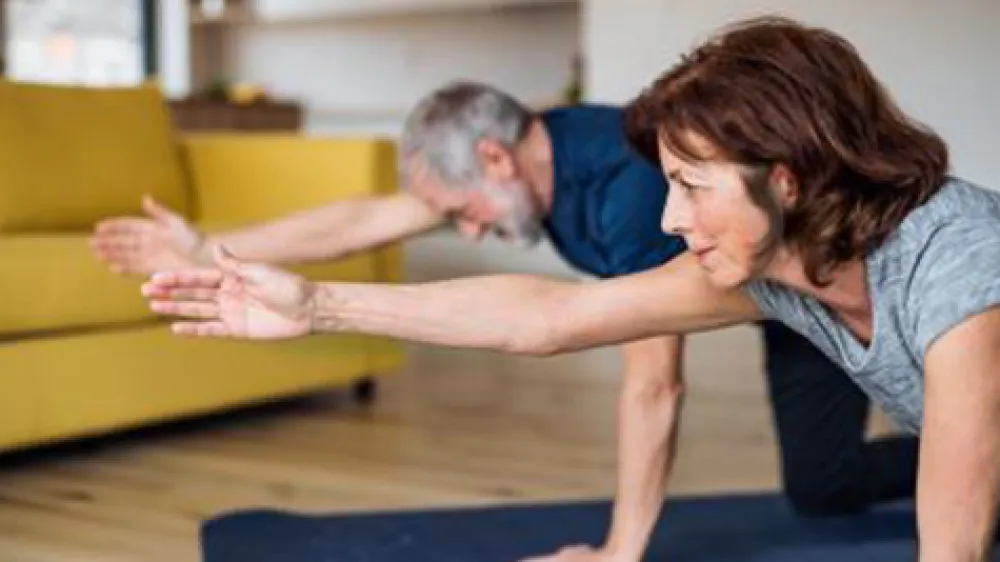Providing your location allows us to show you nearby locations and doctors.
Six Tips for Cancer Prevention

06/28/2020
With concerns about COVID-19, cancer prevention might be the last thing on your mind. The pandemic has changed nearly every aspect of our lives including how we exercise, learn, work, and shop for food. These disruptions to our daily routines and the many challenges nearly everyone has experienced during this trying time could make you less likely to stick to healthy habits that may lower your cancer risk.
Although it may feel more difficult than usual, it’s important to keep up with cancer prevention strategies, such as exercising, eating healthy, and avoiding tobacco use. In fact, healthy cancer prevention habits may be even more important now because of their positive effect on your immune system and overall well-being.
Here are six tips to help you stay on track with cancer prevention even during a pandemic:
1: Establish a new exercise routine
Even though your daily exercise routine may have changed in ways you can’t control, try to incorporate fitness into your “new normal.” Whether that means scheduling virtual exercise sessions, sweating along with a YouTube video, taking a nature walk, or cycling with your kids, establishing a routine that includes daily exercise can provide you with a much-needed dose of stability.
2: Manage a healthy weight
Being overweight or obese increases your cancer risk. The stress and boredom many have experienced during the pandemic can lead to increased cravings for fat and sugar, which — when combined with a lack of physical activity — can result in weight gain. To keep your weight in check, stick as closely as possible to a healthy diet that includes lean proteins, fruits, vegetables, and fiber, and maintain proper portion sizes. Eat mindfully, which means avoiding eating while watching TV or doing other activities. As much as possible, stock your shelves with healthy food options. Also, avoid excessive snacking and stress-baking.
Related article: Four COVID-19 Nutrition Tips for People with Cancer
3: Limit alcohol consumption and don’t smoke
Reports have shown alcohol sales have been up during the pandemic, compared to the same time last year. Alcohol contains empty calories (calories that have no nutritional value) that can lead to weight gain. And moderate to heavy alcohol consumption is associated with increased cancer risk. It’s also important to avoid smoking cigarettes. Smoking is associated with increased risk for nearly all types of cancer, not just lung cancer. Call 1-800-Quit-Now to be connected to your state’s Smoking Cessation Hotline.
4: Be aware of your emotions
The COVID-19 pandemic may have caused you to experience common emotions such as fear, frustration, sadness, boredom, and loneliness. These feelings can sometimes cause you to make poor health choices or slip back into unhealthy habits, such as overeating, smoking, avoiding exercise, or consuming too much alcohol. Being aware of the emotions you’re feeling may help you to manage them in alternative, healthier ways. For example, if you recognize that you’re feeling anxious, consider exercising. Exercise is known to trigger positive feelings and reduce stress. Talk with your doctor if you’re experiencing persistent signs of anxiety or depression.
5: Stay connected
As our communities observe a decrease in new COVID-19 infections, our economies are starting to reopen. Some people will be comfortable resuming activities in public, while others may be more cautious, especially people at high risk of experiencing complications from COVID-19. If you decide to continue limiting in-person interactions but boredom and loneliness tempts you to give up on your healthy habits, talking with a friend or loved one can be the antidote. Sharing your struggles with a trusted, supportive friend or loved one can help you to stay motivated and accountable to continue practicing healthy habits.
6: Don’t delay cancer screenings
Routine cancer screenings may help to prevent cancer from developing, such as colonoscopy screening (colorectal health) and the Pap smear test (cervical health). Other screenings, like mammograms for breast cancer, may help detect cancer at an earlier, more curable stage. Please don’t delay potentially lifesaving cancer screenings because of COVID-19 concerns. Nuvance Health has implemented enhanced safety measures at all of our locations to prevent the spread of COVID-19. To learn more, visit nuvancehealth.org/safecare. Most importantly, speak with your doctor about what types of screenings are right for you. At-home screening options may be available, such as for colorectal cancer.
The bottom line: It’s important to keep up with regular cancer prevention routines and habits even during a pandemic. By following cancer prevention recommendations, you may decrease your cancer risk and improve your overall well-being.
Learn more about Nuvance Health cancer care.
The observations and information in this article are for educational purposes only, do not constitute medical advice, and do not replace the advice of your healthcare clinician.